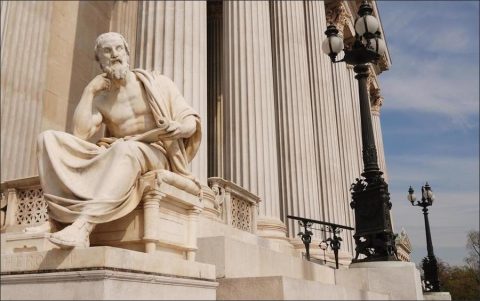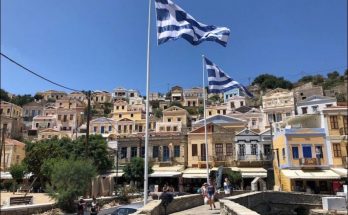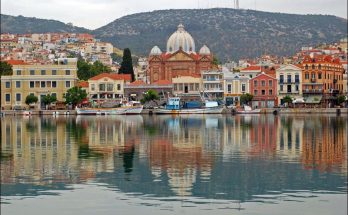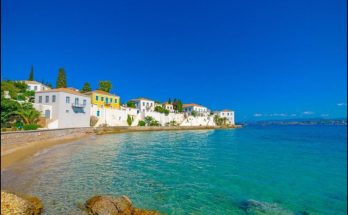Herodotus was born at Halicarnassus, a city of Ionian Greece, in (or not much earlier than) 480 B. C., of a distinguished family, to which the epic poet Panyasis also belonged. After taking part in the tumultuous politics of his native town, Herodotus travelled very widely. It seems that he wrote at least parts of his history in early middle age.
Tradition tells that after a public reading at Athens he received by decree a reward of ten talents, and that Thucydides as a boy was deeply impressed by his work. In any case he must have spent a long time in that city; Sophocles plainly had a high regard for him–he wrote an ode for Herodotus and quotes him several times. He knew the Acropolis and its buildings well. When Thurii was founded ( 444 B. C.) on the ruins of Sybaris in South Italy, Herodotus became a citizen of that town. He died about 426 B. C.
The passages that have been quoted from Herodotus in connexion with the Persian invasions will have shown, to some extent, the character of his work. Much has been written about it, both in praise and in depreciation, but for those who care to read the book itself–of which there are good annotated translations–such criticism is mostly superfluous. Here I shall content myself with offering a few biographical data and a few general remarks.
As historian Herodotus was preceded by Hecataeus of Miletus and Hellanicus of Mytilene. The former has already been mentioned in connexion with the Ionic revolt and as having written a geography ( Travels round the Earth) for the map or globe of Anaximander. His history is mentioned several times by Herodotus, who also speaks of his having been in Egypt. The ‘Attic history’ of Hellanicus is mentioned by Thucydides.
Herodotus, who tells us that he was not accustomed to “boast of his family,” was born (c. 484) in the Dorian city of Halicarnassus in Caria, whence he withdrew, or was banished, in consequence of a revolt against the ruler, or tyrant, Lygdamis–the grandson of that Queen Artemisia whose courage at Salamis was so admired by Xerxes, and also by his historian. Probably in Samos or Lesbos he acquired the Ionic dialect in which he wrote-apparently a selection from the four forms of the ordinary Ionic combined with Attic and epic elements.
His travels extended to Scythia (nearly to the Crimea), Babylon, and Elephantiné (near Assouan). He seems to have returned to Halicarnassus and aided in expelling Lygdamis. His evident admiration for Athens seems to confirm the assertion that he lived there, under the patronage of Pericles, for some time. It is even stated that the Athenians presented him with ten talents for reciting his history at the Panathenaea (c. 446).
Also perhaps he recited it at Olympia; and Thucydides, then a boy, is said to have been present-and to have shed tears; but chronology makes this improbable. In 444-443 the Athenians and the cityless Sybarites founded Thurii, close to the site of ruined Sybaris, and Herodotus may have been among the first colonists. He may also have composed his history (from previous notes) at Thurii, and perhaps he died there about 426.
Some say that he (as also the orator Lysias) returned to Greece, and that he died at Pella, in Macedonia. From his mention of a revolt of the Medes against Darius, which was thought to be the revolt of 408 against Darius II, instead of the earlier revolt against Darius Hystaspes, it has been wrongly believed that Herodotus lived until nearly the end of the Peloponnesian War. In spite of all the sins of omission and commission laid to his charge by the modern historical critic–his inaccuracies, his credulity, his reverence for prophecies and oracles, his belief in the efficacy of images and prayer and sacrifice, his tendency to seek for supernatural causes, his partiality, and so on –this “naive, uncritical, entrancing story-teller” possesses gifts that many a more scientific chronicler might well envy.
By his keen powers of observation he has collected an immense amount of interesting and curious information in regard not merely to events but also to customs and character and cities and countries, and much else, and, what is of even greater importance, his human sympathies allow him an insight into the true causes of things which Thucydides, with all his skilful analysis of secondary and superficial motives, does not possess. The great agent in shaping outward circumstances, as Professor Butcher says, is the human will. But human will is profoundly influenced by beliefs and feelings that lie very deep in human nature, and into these depths mere critical acumen has no such insight as that which is sometimes vouchsafed to the ‘naive’ and sympathetic spirit.
Herodotus is not only the first great prose-author of Greece: he is the last of the pre-Attic writers. Never again in antiquity was it possible for epic largeness and scientific research, for garrulity and dignity, for unquestioning piety and hardheaded sense, for interest in ‘barbarians’ and love of Greece, to be all combined in one great writer. The man whom About called ‘le bonhomme Hérodote’ gave us the immortal story of Thermopylae; he has kinship with Mandevile and Macaulay, with Froissart and Hans Andersen. He stands at the close of an age and must have seemed to Aristotle more alien than to us.
Visits: 378



